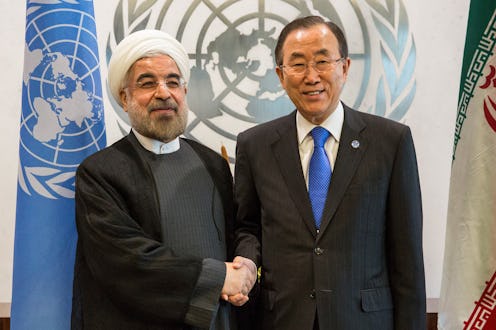News
US-Iran Reach Nuclear Weapons Deal
After over three decades of an antagonistic stalemate between Iran and the United States, talks this weekend in Geneva have finally resulted in a "historic" interim deal that would put constraints on Iran's nuclear program. According to the terms of the negotiations, for the next six months, Tehran will have to stop enriching uranium beyond the levels necessary to use in power stations, and, in return, the international sanctions, worth roughly $7 billion, put on Iran will be temporarily relaxed. Israel, as you might imagine, is not pleased.
Although both sides have emphasized that this is a merely an "interim" step, the negotiations mark the first meaningful, face-to-face talks between the U.S. and Iran since 1979 — and the first compromise Iran has made on its nuclear program for a decade, which, it has continually insisted, is run solely for peaceful purposes (like cancer treatment).
"[It is] an agreement that impedes the progress in a very dramatic way of Iran’s principal enrichment facilities and parts of its program, and ensures they cannot advance in a way that will threaten our friends in the region, threaten other countries, threaten the world. The fact is that if this step – first step – leads to what is our ultimate goal, which is a comprehensive agreement that will make the world safer," Secretary of State John Kerry said Sunday.
The accord mandates that Iran halt all uranium enrichment above 5 percent and dilute below 5 percent (or convert to a form impossible to enrich) its whole stockpile of near-20 percent enriched uranium, among other constraints. It has also agreed to "intrusive monitoring" of its program, and "unprecedented" transparency.
"Iran has agreed to suspend all enrichment of uranium above 5 percent. Iran has agreed to dilute or convert its entire stockpile of 20 percent enriched uranium ... So let me make clear what that means. That means that whereas Iran today has about 200 kilograms of 20 percent enriched uranium, they could readily be enriched towards a nuclear weapon. In six months, Iran will have zero — zero," Kerry added.
On Sunday, Iran's leadership praised the deal, with Iran’s supreme leader, Ayatollah Ali Khamenei, calling the Geneva talks a "success" and thanking President Hassan Rouhani and his negotiating team. Rouhani, for his part, lauded the easing of the international sanctions in a nationally televised address, also calling the deal a "breakthrough."
Not everyone was pleased, however. In spite of continued assurances from Kerry, Israeli leaders were quick to denounce the deal and insult the negotiations, with Prime Minister Benjamin Netanyahu reportedly enraged that the months he spent warning the U.S. of the dangers of an Iranian pact have been for nothing.
"What was achieved last night in Geneva is not an historic agreement, but an historic mistake,” Netanyahu said flatly. “Today the world has become a much more dangerous place because the most dangerous regime in the world has taken a significant step toward attaining the most dangerous weapon in the world."
And Israel’s economic minister, a key member of Netanyahu’s governing coalition, went even further, saying: “If a nuclear suitcase blows up in New York or Madrid five years from now, it will be because of the deal that was signed this morning.” Well. Thanks, negotiators.
"Let me be crystal clear to Israel, to our other friends in the region, to any neighbor who feels threatened, that the next step requires proof certain of a failsafe set of steps which eliminate the current prospect of a breakout and the creation of a nuclear weapon. That will require dismantling certain things. It will require stopping certain kinds of activities. It will require some fundamental choices, and we’re prepared to work with Iran in order to put in place a protocol that achieves those ends," Kerry assured.
"[The deal] will make our partners in the region safer. It will make our ally Israel safer," he added.
Israel, the U.S.'s long-time ally, has long been suspicious of Iran and under surrounding countries who refuse to recognize it diplomatically (as recently as September, Israel claimed it had arrested an Iranian spy). And Israel isn't the only country that feels antagonistic towards Iran — Saudi Arabia, another one of America's close political friends, is also not a fan of the Islamic Republic. But this deal marks the possible easing of a three-decade long impasse between Iran and the U.S., and one whose consequences could be far-reaching: "I am convinced that, after 35 years of animosity and distrust, there is an historic opportunity to rebuild relations," former US President Jimmy Carter said Sunday.
